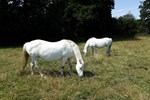Search - Veterinary Services
41 - 50 of 70 results
-
Article
The Value of a New Digital Pathology Platform
The Royal Veterinary College has establishment a digital pathology platform, which allows digital scanning of glass slides to produce high-resolution digital slide images. -
Article
Aortic thromboembolism: Anything new?
Aortic thromboembolism (ATE) is a devastating complication of cardiomyopathy in cats. It is one of the most distressing diseases seen in veterinary medicine and often results in euthanasia due to its poor prognosis. -
Article
Keeping One Step Ahead Through Advanced RVN Education
The RVC recently celebrated the tenth intake of students to the Graduate Diploma in Professional and Clinical Veterinary Nursing. Since its inception, 132 Registered Veterinary Nurses have completed this unique distance learning course. It is designed to enhance RVNs’ knowledge bases, skills and motivation. -
Canine Cancer - Vet's FAQ
Useful information for referring vets about canine cancer from the experts at The Royal Veterinary College -
Nutrition Support
The RVC's Small Animal Nutrition Support Service is led by two board-certified veterinary nutritionists who provide in-house consultations for the RVC's various veterinary clinical services -
Rabbit Neutering (spaying and castration)
Neutering is a surgical procedure to spay or castrate your rabbit to ensure they are no longer able to breed. -
Pet health checks
Comprehensive health checks for all pets at RVC Beaumont Sainsbury Animal Hospital and vet practice in London -
Computed Tomography (CT)
Diagnostic imaging plays a central role in the work-up of the majority of cases seen in the Royal Veterinary College's Equine Referral Hospital. -
Pet Health Plans
The RVC Beaumont Sainsbury Animal Hospital offers pet healthcare plans so you can spread the cost of your pet's regular healthcare needs by paying monthly. -
RVC study reveals multitude of indicators of equine insulin dysregulation and therefore laminitis risk
A new study from the Royal Veterinary College (RVC) has determined new factors that can indicate insulin dysregulation (ID) in ponies. The study findings confirm that physical observation (i.e., looking at the external characteristics of the …

